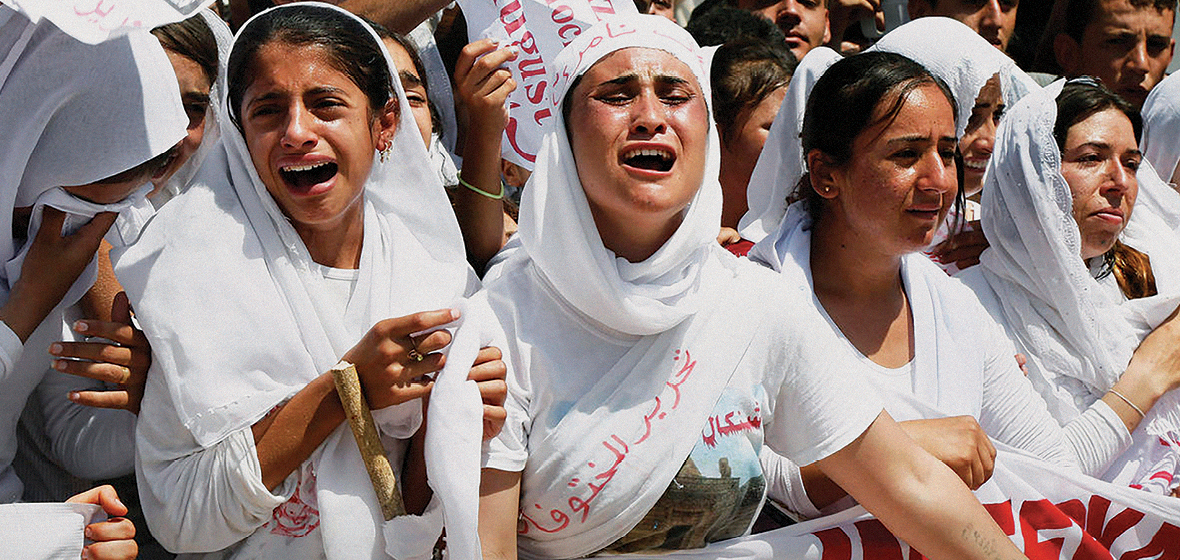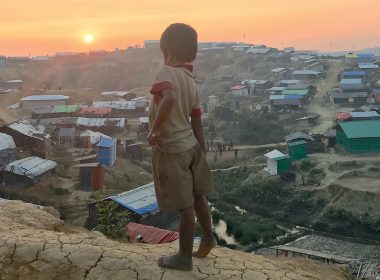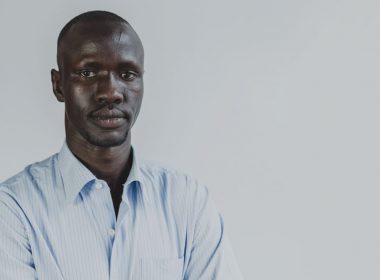New kinds of strategic litigation are empowering forgotten minorities to bring cases for redress before the courts.
In August 2014, Islamic state (IS) fighters swept through Iraq’s Kurdistan region. As they took the district of Sinjar, more than 100,000 people fled north to seek refuge on Mount Sinjar – an exodus that made headlines around the world. IS fighters rounded up those left behind. Women and girls of the Yazidi ethnic minority were taken for the purpose of institutionalised rape. Unmarried women and girls over eight years old were selected first.
International law firm Hogan Lovells, through The Lotus Flower charity, had been donating money for the purchase of sewing machines for young girls and women affected by the conflict. Yasmin Waljee, Hogan Lovells’ London-based International Pro Bono Director, wanted to dosomething more.
“There is no redress at the moment for Yazidi victims, so Hogan Lovells began to think about how we could create a solution,” she says.
“It was our view that we should use domestic legal systems for reparations to ensure the international promises that governments have made are implemented.”
One solution Waljee refers to is a compensation claim brought before the NSW Civil and Administrative Tribunal (NCAT) in March. Through the NSW Victim’s Compensation Scheme, a small group of Yazidi survivors wants the assets of notorious Australian IS fighter Khaled Sharrouf sold to allow for compensation. Sharrouf was killed in Iraq in 2017, and the Yazidi women represented by Hogan Lovells say he held them captive in Raqqa, Syria.
From the Yazidi women, numerous stories of atrocities emerge. Some of the crimes the women allege were perpetrated against them include war crimes, crimes against humanity, and possibly even genocide.
Applying universal jurisdiction
This is the first time a compensation claim has been brought against a state for the overseas crimes of one of its nationals. Lawyers for the Yazidi survivors argue that a universal jurisdiction crime is capable of falling under the definition of “an act of violence” under the Victim’s Rights and Support Act 2013 (NSW).
“We will argue that Australia can prosecute a national for their acts anywhere that they occur in the world, because these are such serious atrocities and Australia has chosen to take jurisdiction of those crimes,” Waljee says.
“[An international jurisdiction crime] would suggest that, in specific circumstances, it’s as though those circumstances have taken place in Australia itself. It is a very unique group of people who would benefit from this.”
The plight of the Yazidi community has received widespread international condemnation since 2014, but Waljee says action has focused mainly on the military defeat of IS. She believes justice for victims has been all but forgotten, and more must be done to bring to account those who enslaved and raped Yazidis.
“There has been resounding advocacy on the part of Australia, the United Kingdom and many western countries about the need for accountability for the victims of IS and the need to recognise their situation,” Waljee says.
“Ordinarily, that would be through the criminal justice process by holding people to account, investigating crimes that have been perpetrated, and universal jurisdiction crimes.”
In 2015, the number of foreign fighters in Syria had grown to 27,000 citizens from 86 different nations. Germany, Sweden and Finland have laid criminal charges against so-called “home-grown” foreign fighters where individuals have returned voluntarily or have been identified within refugee populations. But there have been very few prosecutions across the world and they are mostly around terrorism, not war crimes.
Thinking beyond crime for redress
Waljee is urging Australia to show leadership by giving force to public statements about ensuring accountability for IS foreign fighters who have harmed Yazidi women. Last year, the Australian House of Representatives acknowledged that the actions of IS had amounted to genocide of the Yazidis.
“We have many states across the world talking about their commitment to seeing accountability, to seeing reparations. In these circumstances, it seems to me that our compensation systems have to implement international human rights law and give effect to those rights,” Waljee says.
By seeking redress for the Yazidi women through a civil claim for compensation, the group overcomes any difficulties that Sharrouf is deceased. The witness statements given by the Yazidi women have also been taken to a criminal standard of proof.
“When you have an [alleged] perpetrator who has been deliberately targeted and killed, the prospect of a criminal prosecution is limited. So how do we get accountability for the victims?” Waljee asks.
“For reparations [a principle recognised in international law], the compensation system is separate to criminal justice. You don’t actually need a successful prosecution, just for the victims to be willing to cooperate with police, which we have done.”
A team of 15 lawyers at Hogan Lovells is working on the compensation case and an even larger team is researching the law on international reparations. They are also building extensive background material on the IS regime, its slave trade, and its organised system of “rape, capture and sale”.
Waljee believes this case is part of an emerging trend to reinforce the rights of victims and ensure they are not forgotten.
“There is growing jurisprudence at an international law level on the rights of victims: what they are entitled to in terms of an effective investigation, reparations, and support,” she says.
“Whenever we have a huge atrocity there is a focus on the perpetrator, inevitably. At the same time, we need to respect the rights of victims. There is a role for lawyers to ensure the rights of victims are seen as equally important.”

Making room for legal activism
Not every group in society has a law firm offering pro bono services. While strategic litigation is becoming a powerful tool in Australia and other countries, it is sometimes referred to as “legal activism”. Barrister Peter Cashman says commentators often use the term to imply undesirable political activity.
“In reality, much if not most of so-called strategic litigation is about access to justice and the clarification and enforcement of legal rights. This is often for the benefit of disadvantaged individuals and groups,” Cashman says.
“Insofar as this may be to the detriment of sections of the business community or governments, it is not surprising that those who have abused their power and contravened the law may feel threatened by those seeking redress.”
Cashman is a board member of The Grata Fund, which offers financial support to strategic litigation with the objective of “re-opening” the courts and democracy to protect the community’s rights and freedoms. By providing adverse cost protection and disbursements funding, it allows important actions to be pursued without the concern of a financial return or political risk. The goal is to make the courts a tool for justice and change for everyday people.
Grata Fund founder and executive director Isabelle Reinecke says that while strategic litigation may lead to systemic change that affects large groups of people, it is always about applying the law and enabling access to the third arm of democracy. A former director of GetUp’s legal and governance team, Reinecke says activism and lawyering can be complementary.
“Strategic litigation simply seeks to clarify existing law and the basic legal entitlements owed to individuals and communities,” Reinecke says.
“Activism pushes for social change by targeting decision-makers through campaign strategies like non-violent direct protest, petitioning and mass mobilisation. In the courts, those sorts of approaches aren’t relevant or appropriate. You’re not winning the hearts and minds of judges – you’re winning with detailed facts, precise reasoning, and the applicable legal principle.”
Some of the causes Grata Fund has helped bring before the courts have included matters relating to freedom of information, police brutality, and anti-dissent laws. It also connects members of the public to legal experts.
Lou Dargan, Grata Fund’s head of strategic litigation, is of the view there is nothing wrong with “legal activism” if all that means is using the courts to act as a check on power and government or corporate overreach.
“Laws exist because our parliaments have enacted them. In doing so, they have agreed to ensure the minimum levels of protection that the laws provide,” Dargan says.
“Similarly, parliaments have agreed to impose certain standards of behaviour or regulatory requirements on corporations. Other rights and protections have been developed through the common law. Strategic litigation seeks to hold governments or other actors accountable to those laws.”
Redress in the outback
In 2016, a group of Indigenous people living in the outback community of Santa Teresa brought an action against the Northern Territory government. The Eastern Arrernte people, residing in 70 remote public houses 80 kilometres southeast of Alice Springs, had had enough. With the assistance of Australia Lawyers for Remote Aboriginal Rights (ALRA) they went to court to fight for their rights.
The claimants told the NT Civil and Administrative Tribunal (NTCAT) of at least 600 requests for repairs, which had gone ignored for five years. One tenant complained of being unable to use her shower or toilet for weeks at a time. When she reported the issue to the Department of Housing, nothing was done for almost a year.
Another tenant had no way to secure their premises, and a missing air conditioning unit meant they were unable to occupy their home for several months, with temperatures hitting over 40 degrees in summer. Others had unreliable electricity, no working stove or indoor cooking facilities, and no smoke alarms.
As soon as the residents filed their claim, the government sent contractors and tradesmen to their properties. The group’s lawyer, Daniel Kelly, says this was an empowering response for his clients, who saw the impact of standing up for their legal rights. But the Department of Housing responded with a counter-claim to pursue unpaid rent.
“The conditions Aboriginal people have had to live under in remote communities are outrageous,” says Kelly, the lead lawyer for ALRA.
“For the first time they have been able to hold the government to account … and the disgraceful state of their housing. However, it is important not to overstate the impact of the case because people are still living in overcrowded housing in a broken system.”
Remote possibilities
NTCAT handed down a decision in February. It has been hailed as landmark because it is the first time the Residential Tenancies Act has been applied to remote Aboriginal tenants. ALRA was able to show that the NT Department of Housing allowed rental debts to accumulate for years without telling anyone – indeed, the first time the tenants were notified was at the time of the counter-claim.
Kelly argues that the Tribunal’s findings justify a major policy re-think about public housing in remote regions.
“There has simply been decades of under-investment, as government funding never seems to reach the ground. The case shows that the same law and housing standards that apply in Sydney apply in Santa Teresa,” says Kelly.
“It is also significant because it has thrown the tenancy system throughout the NT into question. It is now clear that most, if not all, of the tenancy agreements … with remote tenants are void or invalid.”
Kelly does not consider himself a legal activist and says the Santa Teresa housing tenants are just trying to access the most basic consumer rights. But he does credit the Grata Fund with providing commitment, energy and funding to meet the costs of litigation.
“All of our services are provided pro bono, but working with remote people does incur costs, particularly around travel.”
And that is exactly what the Grata Fund wants.
“Courts function as a crucial part of Australian democracy, but often the financial barriers are too high for people to have matters in the public interest. Grata is a people-powered model where regular people chip in to help the mum-and-dad shareholders, the remote Indigenous communities, or groups like Doctors for Refugees challenge powerful corporate or government and access a crucial part of our democracy – the justice system,” Dragan says.
“There’s huge possibility to use novel strategies to take on public interest cases in Australia and get this pillar of our democracy up to speed with those around the world.”




